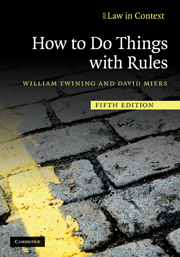Book contents
- Frontmatter
- Contents
- Preface
- Online appendices
- Acknowledgements
- Abbreviations
- Table of statutes and legislative instruments
- Table of cases
- Part I
- Part II Reading, using and interpreting rules in general
- Part III Reading law: reading, using and interpreting legislation and cases
- Part IV
- Index
- Resources on the web
Preface
Published online by Cambridge University Press: 05 June 2012
- Frontmatter
- Contents
- Preface
- Online appendices
- Acknowledgements
- Abbreviations
- Table of statutes and legislative instruments
- Table of cases
- Part I
- Part II Reading, using and interpreting rules in general
- Part III Reading law: reading, using and interpreting legislation and cases
- Part IV
- Index
- Resources on the web
Summary
All of us are confronted with rules every day of our lives. Most of us make, interpret and apply them, as well as rely on, submit to, avoid, evade and grouse about them; parents, umpires, teachers, members of committees, businesspeople, accountants, trade unionists, administrators, logicians and moralists are among those who through experience may develop some proficiency in handling rules. Lawyers and law students are specialists in rule-handling, but they do not have a monopoly of the art. A central theme of this book is that most of the basic skills of rule-handling are of very wide application and are not confined to law. There are certain specific techniques which have traditionally been viewed as ‘legal’, such as using a law library and handling cases and statutes. But these share the same foundations as rule-handling in general: they are only special in the sense that there are some additional considerations which apply to them and are either not found at all or are given less emphasis in other contexts.
The purpose of this book is to provide a relatively systematic introduction to one aspect of rule-handling: interpretation and application. It is written particularly for students of law and administration, but most of it is directly relevant to problems of rule-handling in non-legal contexts. Within legal education, the focus of attention is orthodox in that it concentrates on certain traditional skills and techniques which have commonly, though misleadingly, been referred to as ‘legal method’, ‘juristic method’ or ‘thinking like a lawyer’.
- Type
- Chapter
- Information
- How to Do Things with Rules , pp. xiii - xxiiiPublisher: Cambridge University PressPrint publication year: 2010

